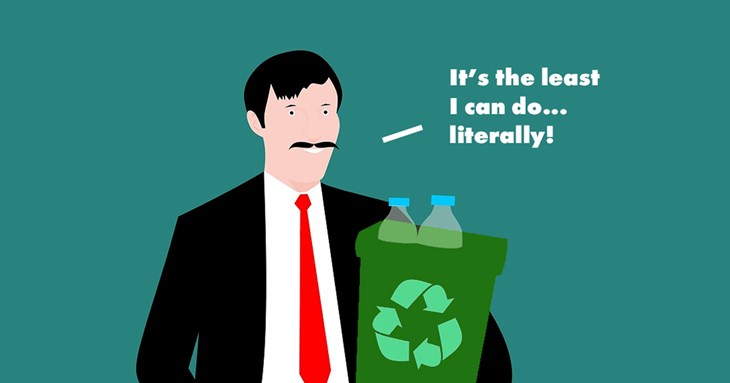How recycling won’t save the planet - Denis the Dustcart Blog
Published: 10 November 2021

In his regular feature, Denis the Dustcart talks about how recycling won’t save the planet, but how we won’t save the planet without recycling.
You can follow Denis on his Facebook page to keep up with information about Recycling issues.
I’m going to make a controversial statement for a recycling page:
Recycling is nowhere near the most effective thing you can do to reduce your impact on the planet.
But here’s why you should still bother.
Recycling in itself isn’t going to save the world, but it is part of the solution – vitally important in the effort to avert climate breakdown.
Every effort we make to lessen the harm we do is a necessary effort.
Not that recycling at home takes much effort. In Exeter it’s simply a case of choosing between two bins.
Even with all the confusion over what can and can’t be recycled, it’s just about the easiest thing we can do to help the planet.
Because it doesn’t involve changing how we live.
Because recycling is just a way of reducing the harm of something at the end of its life.
The majority of the harm was done already in producing whatever it was we bought – what the packet contained – and in the journey it took to get from wherever it was made into our homes.
We can’t afford to focus only on the packet. We need to look at the whole product.
Recycling is about waste. Waste is the result of stuff being made to consume, and how we consume as a human race is responsible for the sheer amount of waste we produce.
We need to consume less to waste less.
Assessing the impact of recycling on a scale of ‘how we can reduce our emissions’, for example, is largely missing the point.
Emissions are mainly produced in bringing about what the packaging contains. The sheer amount of stuff produced for us to consume – so much of which is wasted – is symptomatic humanity’s drive towards constant growth on a finite planet.
Recycling is about making sure we don't have to make so many new things from raw materials to package the things we consume.
Recycling aluminium cans, for example, means less mining for raw bauxite and therefore less of the ecological, environmental and human horror that goes with that.
What it doesn’t do is reduce the massive impact of the production of the drink the cans contain.
On the other hand, recycling plastic meat trays or exchanging them for paper packets isn't going to prevent the rainforests being cut down to enable livestock grazing and the growing of crops to feed those animals. It isn’t going to offset the impact of meat production in our own country.
The food we eat – let alone any we waste – deserves more of our eco-focused attention than what it came in.
Taking our fast fashion home from the shop in our own bag isn’t going to make a dent in the harm done by the production of those clothes.
None of this lessens the importance of recycling; it just sets it in the context of a system that causes harm.
Recycling both supports this system and reduces its impact on the world. Supports it by turning our waste into products we can consume again, and reduces its impact by the same feat.
What that means is simply this: until we solve the problems of production and consumption, recycling will remain of the utmost importance.
This is why in Exeter our team is constantly seeking solutions for the vast amount of problem plastic produced by consumerism. Capturing waste for recycling before it ends up in the environment – or even, in the case of some of Exeter’s amazing partners, capturing it from the environment – is clearly imperative in protecting our planet and life on it.
But what I’m saying is that these problem plastics are only part of the story – part of the impact. Because the majority of the harm has probably been done before whatever was captured became waste.
It’s easy to manage the waste we produce at home when we’re presented with easy ways of dealing with it. It’s easy to imagine that by recycling we’re doing as much as we can.
In a society geared towards constant growth, people are generally working flat-out. ‘Life’s too short’ is the motto not only of those indifferent to the harm their wasteful habits cause, but of the stressed and the weary.
Recycling is literally the least we can each do, but that doesn’t make it less important. We won’t solve the problems of the world only by recycling, but we will be helping to turn a vital cog in the system of change.
Keep recycling.

